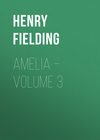Kitabı oku: «The Lovers Assistant; Or, New Art of Love»
INTRODUCTION
The publishing history of this translation has been sketched by Cross, in his History of Henry Fielding, and may simply be summarized here. The first edition, entitled Ovid's Art of Love Paraphrased and Adapted to the Present Time (or Times) was first issued in February, 1747, and was advertised in the Gentleman's and Scots Magazines in that month. During March, further advertisements appeared in the London Magazine and the St. James Evening Post. The most extensive notice ran, however, in Fielding's own Jacobite Journal (No. 15), where it served as basis for a detailed comparison between the art of love and the art of Jacobitism. Of this 1747 anonymous, original edition no copy is known.
In 1759, the work was reissued in London and Dublin, under the title The Lover's Assistant, and again in London in 1760. Meanwhile, advertisements for the original edition, as by Henry Fielding, had been run by the publisher, Andrew Millar, in 1754 and 1758. Inasmuch as Millar apparently still had unsold sheets in 1758, the 1759 edition may comprise these sheets with new title pages and prefatory matter necessary because of Fielding's death in 1754. At any rate, the "modern instances" referred to by the author of the 1759 Preface are not too modern to have been written in 1747. There has been no reprint since 1760.
The present text is printed from the 1760 edition, collated with a copy of the 1759 issue. The Latin text, which in the original faces the English, is omitted. Notes keyed by letters and asterisks appear in the original; it will be noted that Fielding's notes combine scholarly and facetious remarks; he frequently used footnotes for comic effect, especially in the translation of the Plutus of Aristophanes in which he collaborated.
Literature affords few pleasures so satisfying as translations done by those who are not only expert in the languages concerned, but who also are of the same spirit as the authors they translate. Some examples come readily to mind: Pope's Horace, Dryden's Juvenal and Persius, Smollett's LeSage, Lang's Aucassin and Nicolette, and Pound's translations from Provençal. Such a felicitous combination appears in Henry Fielding's translation of Book I of Ovid's Ars Amoris.
Throughout the sixteenth and seventeenth centuries, English translators of the classics abounded, including Marlowe, Jonson, Chapman and Sandys; Roscommon, Waller, Denham, Cowley and Dryden. By 1700, the major kinds of translation had been differentiated, described, evaluated and practised.
To summarize, Dryden wrote as follows in his Preface to the 1680 edition of Ovid's Epistles, Translated by Several Hands:
All translation I suppose may be reduced to these three heads:
First, that of Metaphrase, or turning an Author word by word, and line by line, from one language to another… The second way is that of Paraphrase, or Translation with Latitude, where the Author is kept in view by the Translator, so as never to be lost, but his words are not so strictly follow'd as his sense, and that too is admitted to be amplyfied, but not alter'd… The Third way is that of Imitation, where the Translator (if now [i.e. by taking such liberties] he has not lost that name) assumes the liberty not only to vary from the words and sence, but to forsake them both as he sees occasion: and taking only some general hints from the Original, to run division on the ground-work, as he pleases…
Doubtless, he refers to the translation of verse into verse, but actually verse-into-prose also falls within Dryden's "third way." When the author of the Preface to The Lover's Assistant speaks of it as an "undertaking" in translation, he means prose imitation, or paraphrase of verse.
Earlier, in the 1743 Miscellanies, Fielding had published "Part of Juvenal's Sixth Satire Modernized in Burlesque [i.e. Hudibrastic] Verse." The modernization, as in his Art of Love, was of place (England instead of Italy) as well as time, and allowed the author to satirize some of his contemporaries, as well as the customs of his own age.
When, four years later, he turned to the first book of Ovid's Artis Amatoriae, he found prose an even better medium for "Imitation," or "Modernization." The result is a most enjoyable pot pourri of Roman mythology and eighteenth century social customs, combined with some of the patriotism left over from Fielding's anti-Jacobinism during the Forty-Five. His devotion to, and constant use of, the classics has excited comment from every Fielding biographer since his own time. His works abound in classical instances, references and imitations; and most of his writing includes translations from Greek or Roman authors. His library, as Austin Dobson observed, was rich in editions of the classics.
Curiously, the sale catalogue lists only one, unidentifiable, Ovid item, as contrasted with 5 editions of Horace, 9 of Lucian and 13 (between 1504 and 1629) of Aristotle. This probably means that, along with other unlisted works known to have been in his possession, his Ovid was retained by his family or given to a friend. Dryden's translation of Book One of the Ars Amoris is included among Fielding's books, however, and Cross suggests that Fielding "kept one eye" on it. It is surprising how much visualization there is in his imitation. Many of the incidents resemble those treated by Hogarth, with whom by 1747 Fielding was on excellent terms. There is also some resemblance in his contemporaneous materials, or modernization, to scenes in Fielding's own later plays, and in his novels.
PREFACE
This Work was begun many Years ago, though altered in some Places by the Author, before his Death; as will appear by the modern Instances introduced in it. Many of which being so applicable to the present Time, is the Occasion of it being now published.
As to any Exception which may be made to the Impurity of this Work, we shall transcribe what was written long ago in its Defence, from the Preface prefixed to Mr. Dryden's Translation of this Poem.
'A great many People are mistaken in these Books; and tho' they were made use of as a Pretence to drive the Author from the Court of Augustus, and confine him to Tomos on the Frontiers of the Getae and Sarmatae, yet they were not the true Cause of his Confinement. They are very far from being so licentious as the Writings of several other Poets, both Greek and Latin. However we must own he might have been a little more discreet, especially in some Places1
'That which offended the Romans most in this Work, cannot touch us. It has always been more dangerous in Italy to converse with Women of Honour, and frequent their Houses, than 'tis with us; where there is more Liberty, and what in that Country may be an Occasion of Debauchery, would not at all be so in ours.
'Notwithstanding all that has been said against these Books of the Art of Love, by some over-scrupulous Persons, whose Discretion has too much of Affectation in it: they are not only necessary for the Knowledge of the Latin Tongue, and the Roman History, concerning which they contain several Things very particular; but for the noble Sentiments we find in them, which the Gravest and Learnedest Writers have thought worthy to be quoted for Authorities.
'In a Word, there's nothing in them that comes near the Licence of some Epigrams of Catullus, Martial, and Ausonius, of some Satires of Horace and Juvenal, and several other Pieces of Ancient and Modern Authors, which are read and commented upon; and about which even celebrated Jesuits and other religious Persons, as eminent for their Piety as their Erudition, have employed their Studies. Yet who has condemn'd or complain'd of them? We must confess, such Things should be managed with Address; and those of them who have meddled with any of the Authors I have named, have shewn that it may be done so, by their succeeding so happily in it.
'As for this Treatise of the Art of Love, for which the Author has also prescrib'd a Remedy, as it is liable to be ill interpreted by those whose Pens poison every Thing they touch; so it may bear a good Construction, by such as know how to turn every Thing to Advantage.
'I will yet say, this Art may be apply'd to those that intend to marry. There is nothing sure against Decency in all that. I agree, if you will have it so, that it extends so far as to direct one to the Means to gain a Mistress. If this was not lawful heretofore in Italy, on account of the jealous Humour of the Italians, we cannot, for the same Reason only, say it ought to be forbidden in our Country, any more than in several others, provided we could be sure the Ladies Modesty would not be offended, before whom Youth should be always careful not to exceed the Bounds of the Respect that's due to them.'
To this I may add, that if the Objection of Impurity lies against any Part of this Work, it is only against the two latter Books, for in that which we have here paraphrased, there is nothing capable of offending the nicest Ear.
With regard to the Merit of this Paraphrase, which is entirely a new Undertaking, and might perhaps, if properly encouraged, be carried on with other Latin Poets, we shall only observe, that the utmost Care hath been taken to preserve the Spirit and true Sense of the Author, and where we have been obliged to deviate, we have given the literal Translation in the Notes.
Upon the whole, we cannot suppress, what one of the most learned Men of this Age, said upon persuing the Paraphrase, viz. That he thought it would serve better to explain the Meaning of Ovid to a Learner, than any other Translation, or all his numerous Commentators.
BOOK I
If in so learned an Age as this, when Arts and Sciences are risen to such Perfection, there be any Gentleman unskilled in the Art of Loving, let him come to my School; where, if he hath any Genius, he will soon become an Adept: For I would by no means have any young Gentlemen think, that Erudition is unnecessary upon this Occasion. It is well known that the 2Rules of Art are necessary to the Conduct of a Ship; for which reason, none but able and experienced Seamen are preferred to the Command of one. Rules are necessary even to make a good Coachman, as those Gentlemen who have the Ambition to excel this way very well know. In the same manner is Art required to drive the Chariot of Love well. Now it hath pleased Venus to place me in the Coach-Box: what a Captain is to a Ship, or the Driver to his Chariot, that am I to Love. I own indeed Master Cupid is a little wild, and often stubborn; but he is only a Child, and of an Age to be disciplined: And however fierce the Disposition of a Lad may be, a judicious Schoolmaster knows very well how to correct it: For many a Boy who hath afterwards turned out a Hero, hath when at School very patiently submitted to the Lash, and quietly, at the Word of Command, held out his Hands to be whipt 3. Duke William 4 himself, when a Lad, very possibly submitted to Correction; and he 5 who was hereafter to become the Terror of his Enemies, might in his Youth have been afraid of his Tutor. Mr. Pointz was his Preceptor: I am the Preceptor of Love. Both these Youths were of a fierce Disposition, both elevated 6 in their Birth. But as the stoutest Ox submits himself to the Yoke, and the most fiery Horse to the Bridle, so shall Love to me. Though he may bend his Bow against my Breast, and shake his Torches at me; no matter: nay, the more he pierces me with his Arrows, the more he burns me, the more severely will I be revenged of him.
But here, Master Apollo, I will tell no lies to my Readers. I do not pretend to have received any Inspiration from you, any more than from Parson Whitefield 7: And as for Miss Clio 8 and her eight Sisters, I never visit them; nor have I even a Cap-Acquaintance with them. I write from Experience only; and Experto crede Roberto is my Motto. I promise my Readers that I will tell them truth; and if I must, for form sake, invoke any Muse, Venus herself shall be the Person 9. Sweet Goddess! then be thou present, and smile at my Undertaking. But as for you who cannot smile, I mean you, Prudes, with your screw'd Faces, which may be considered as Signs hung forth before the Door of Virtue, and which perhaps, like other Signs, promise what is not to be found in the House; I desire neither your Favour nor your Company. Good-natur'd Girls10 are all I write to; and such I promise them may read my Works without a Blush.
Know then, my good Scholar, that art unexperienced in the Art of Love, that this Art consists of three principal Points: First, to select a proper Mistress: Secondly, to win her Affections: And, Thirdly, to preserve your mutual Affection. Of all these therefore we will treat; or, to speak metaphorically, through these three Roads we will drive the Chariot we have undertaken to guide.
First then as to the Choice of a Mistress, to whom you may say, In Thee alone my choice is fixed. Do not believe such a one will fall into your Lap. It will become you to look about sharp for her, and with all your Eyes, I do assure you. And here my first Instruction shall be, where she may most probably be found: For he is a bad Huntsman who would beat about the Royal Exchange for a Hare or a Fox; and not a much better Gunner or Fisherman, who goes a shooting in Somerset-Gardens, or attempts to angle in the magnificent Bason there. As these all know the Places where their Game resort, so must you.
Here then, I by no means advise you to make a long Voyage after a foreign Mistress, as Perseus did, who fetched Andromeda11 from the Indies; or Paris, whom nothing would serve but a Grecian Mistress. Your own Country, my Friend, will produce Women which the World cannot equal. Beauties are as plenty in the City of London as Apples in12 Herefordshire, or Grains of Wheat13 in Hampshire; they are indeed as plenty as Fish in the Sea, or Birds in the Air; nay, the Sky hath not more Stars than London hath Beauties: for England14, not Cyprus, is the Queen of Love's favourite Island. Whether you love green Fruit, and which is in the Bud only, or Beauty in its fuller Bloom, or that which is arrived to perfect Ripeness; nay, if nothing but Wisdom or Sagacity will serve your turn, of these too Old England will afford you a sufficient Plenty.
In the pleasant Month of May, repair to Vaux-Hall15. Here take your Evening Walk, either round the verdant Scenes, where Nightingales, the only Foreigners who give us their Songs for nothing, warble their most delicious Notes. When your Limbs demand Repose, you may enjoy it in an Alcove, from whence the embattel'd Troops of Venus will pass in review before you. Again, the lofty Dome of Ranelagh invites your Steps. Whether the illustrious Artist took his Model from that House, which as a Reward for their Industry, or for some little regard for their Honey, the benevolent Nature of Man hath conferred on that laborious Animal the Bee: Or whether a more pious Disposition chose this Form from the musical Instrument which summons the whole Parish to Church: Or whether the wondrous Force of Genius, unassisted by any Model, did not of itself strike out this wondrous Architecture; let Kent or Benson inquire. Hither, from every Corner of the Town, repair the loveliest Nymphs. Here too thou may'st survey them, either walking or reposed on Benches at thy Ease. Nor is the Mall to be neglected, where once die brawny Arm of Charles displayed its Strength, and beat his subtle Courtiers at the Play, whence it derives its Name. Nor, Kensington, must thy Gardens be passed by, once the Delight of mighty Caroline, and to the future Age a Monument of her Taste. Here the Charmers draw in sweet Air, and send it forth again in sweeter Sighs, as Tributes to the loved Memory of that mighty Queen. As for the Ring, formerly the Scene of Beauty's many Triumphs, it is now become a lonely deserted Place: Brilliants and brilliant Eyes no longer sparkle there: No more the heedless Beau falls by the random Glance, or well-pointed Fan. The Ring is now no more: Yet Ruckholt, Marybone and The Wells survive; Places by no means to be neglected by the Gallant: for Beauty may lurk beneath the Straw Hat, and Venus often clothes her lovely Limbs in Stuffs. Nay, the very Courts of Law are not excluded; and the Scenes of Wrangling are sometimes the Scenes of Love. In that Hall where Thames sometimes overflowing, washes the Temple of Venus Lucy, the grave Serjeant becomes a Victim to the Fair; and he who so well knows how to defend others, cannot defend himself. Here the Special Pleader loses all Power to Demurr, and finds beyond his Expectation a novel Assignment spring up in the Cause. Him Venus Lucy16 laughs at from her neighbouring Temple; for the Council is now become the Client, and squeezes an empty Hand harder than he ever did a full one. But above all, the Theatres are the Place of Sport: for these will be most fruitful to your Wishes. Here you will find one Object to love, and another to toy with. Some, of whom a single Touch will suffice, and others, in whom you will desire a stronger Tenure. Neither do the Ants in pursuit of Grain, or the Bees in quest of Flowers, swarm in greater Numbers than the Beauties to the Theatres. The variety of Charmers here have often distracted my Choice. Hither they come to see, and to be themselves seen; and many are the Love-Bargains here made.
– Dii, caeptis, (NAM VOS MUTASTIS ET ILLAS) Adspirate —
But the strongest Piece of Burlesque of this kind is the Invocation to Venus at the Beginning of Lucretius: For what can be more so than a solemn Application to a Deity for her Assistance in a Work, the professed Intention of which is to expose the Belief of any Deity at all; and more particularly of any Concern which such superior Beings might be supposed to take in the Affairs of Men. For my own part, I must confess, I cannot perceive that graceful Air of Enthusiasm which a noble Author observes in the Invocation of the Antients; many of them indeed seem to have been too apparently in jest, to endeavour to impose on their Readers, and in reality to apply to the Muses with less Devotion than our modern Poets, many of whom perhaps believe as much in those Deities as in any other.
To explain these several Particulars to an English Reader, it must be known, that the Portico's in Rome were the publick Walks; and here Persons of both Sexes used to assemble. Among these was one built by Pompey. The second Portico mentioned, is by the best Commentators understood of the Octavian, which was built by Octavia, Sister to Augustus, and Mother to Marcellus; and this adjoined to a Temple built by the same Marcellus. The third Portico was built by Livia the Wife of Augustus, and called from her Name. The fourth, where the Picture of the Belides was, is to be understood of the Portico of Apollo Palatinus, in which were the Statues of the fifty Daughters of Danaus and Grandaughters of Belus. These being married to the fifty Sons of their Uncle AEgyptus, every one, by her Father's Command, slew her husband on the first Night, save only Hypermnestra. For this they were punished in the lower World, by being obliged to fill a Barrel full of Holes with Water. Scaliger and others have here made a mistake, supposing the Picture of the Belides was here hung up: But the contrary appears by many Authorities, particularly by this in Qv. Trist. 3.
Signa peregrinis ubi sunt alterna columnis, Belides, & stricto barbarus ense pater.
It appears that the Number of Pillars was equalled by the Number of Statues. 5thly, The Temple of Venus, in which she was worshipped, together with Adonis, after the Assyrian manner. This Adonis was the Son of Cinyras King of Cyprus, begotten by him on his own Daughter Myrrha. The Fame of his Beauty, and the Passion which Venus bore towards him, are well known. 6thly, The Jewish Synagogues. The Jews having been encouraged by Julius Caesar, were very numerous in Rome at that time; and the Strangeness and Pomp of their Ceremonies inviting the Curiosity of the Roman Ladies, their Synagogues became famous Places of Intrigue. 7. The Temple of Isis. This Goddess, when a Woman, was called Io. She was the Daughter of Inachus; and being beloved by Jupiter, was by him, to preserve her from his Wife's Jealousy, turned into a Heifer, Juno suspecting the Fact, obtained this Heifer of her Husband, and set Argus to watch over her. Jupiter wanting to visit his old Friend, sent Mercury to kill Argus; in revenge of which, Juno ordered a Gad-Bee to sting the poor Heifer; which thereupon growing mad, ran to Egypt, where she was again restored to the Shape of a Woman, and married to Osiris. The Feast of Isis was celebrated in Rome ten Days together by the Women, and was a time of Carnival among them.











